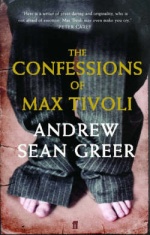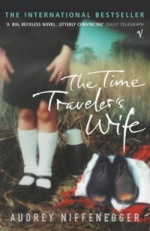
I’ve just finished reading The Confessions of Max Tivoli by Andrew Sean Greer. It was well written and reasonably enjoyable but didn’t really compare to the book that inspired me to buy it, The Time Traveller’s Wife by Audrey Niffenegger. Both are essentially about how complicated love can be when one of the people involved has some genetic abnormality and so doesn’t experience time in the same way as the other. They are also much better than that lame summary suggests.
The Confessions of Max Tivoli
This book is, funnily enough, about a character Max Tivoli, born in 1871 and getting younger by the year. He is born with the appearance of an old man and physically regresses to childhood throughout his life. The focus of his story is his love for Alice: they first meet when he is 17 (but looks 53) and she is 14, then again when they are (and for Max, appears to be) both in their mid-30s, and then for a final time when they are in late middle age but Max appears to be a 12 year old boy. Needless to say, love doesn’t run smoothly for the pair, particularly as Max has vowed never to tell anyone about his condition.
The book is set between 1871 & 1930 and its first person narrative, by Max, is evokes the time well. My only issue with the time-setting was, perhaps, one more of geography: knowing very little of the geography of the San Francisco area during that era made it a little hard to follow in parts.

The three main characters are Max, Alice and his friend Hughie. Hughie is a lifelong friend of Max’s, one of the very few people that know of his condition, but isn’t developed as fully as a character as one might hope – particularly with his involvement in the third part.
Alice is constantly referred to as independent and vivacious, chanting proto-feminist statements and shunning public expectation. If this book had been written at the time it is set, this side of Alice would have made me positively giddy with glee; but like the feminist views and happy coincidences in Diary of An Ordinary Woman by Margaret Forster, it seems somewhat lacking when written from our current perspective. It just doesn’t seem particularly creative given the character has crept out of today’s mindset when that sort of woman is increasingly the norm.
Max himself is pleasant enough but, perhaps because the book is told in hindsight, from his age of 59 years, he never seems to engage in the wanton gnashing and wailing that I would expect someone in his position – particularly during his teenage years when gnashing and wailing is de rigueur.
Because of the focus on the love story, other elements of Max’s life are missed out, and I can’t help but wonder if I would have preferred it if it had been more filled out. For example, he works at the same company as a clerk for a number of years but there is never any mention about people there’s reactions to his increasing youth. Similarly, more coverage of the day to day coping with his condition would have nice: for example, I realise San Francisco at the turn of the century probably wasn’t as identity-conscious as we are now, but did he have to acquire fake certificates and identification in order to “pass” at his different ages? Maybe that’s why I preferred the Time Traveller’s Wife…
The Time Traveller’s Wife

The Time Traveller’s Wife has an even more complicated narrative structure than …Max Tivoli. Each page or so is from a different time, and it isn’t as straight-forward as Max getting younger while Alice gets older, but there is a linear path running through it, starting from the point where Clare meets Henry in the library.
Another “exactly what it says on the tin” title, this book is about a time-traveller, Henry and the love of his life (and for most of the book, his wife) Clare. Henry has a genetic condition that causes him to leap about in time within his own life-time Sam-Beckett-style, although he just appears as himself at any point and doesn’t really “put right what once went wrong” etc. To quote from the cover, “periodically his genetic clock resets and he finds himself pulled suddenly into his past or future.”
Because of the complicated structure, the book is a little hard to get into at first and sometimes is a little hard to remember what has happened to the real Henry (or Clare) to that point and what is in the future for one or both of them. However, it is really worth trying to keep up with it.
Henry fills in the gaps that were missing from …Max Tivoli: whenever he time travels anywhere, he does so naked and leaves behind a pile of clothes. He discusses the problems this causes at work (where they become suspicious of his disappearances) and the criminal skills he requires to survive at his destination (to acquire clothes etc). These skills pleasantly jar with his “normal” life, working in a library and I felt that these added depth to the character, in a whatever-it-takes-to-survive way.
Clare is also a well rounded character. She knows Henry is her soul mate because she has grown up with him, knowing almost all along that it is to be. However, knowing the future (for example, that they have a life together and that, later on, they have a child) doesn’t stop her doubting what is happening in the present and the very first (iirc) chapter is her discussing how hard it is to be left behind when he jumps away – particularly as they get older and they realise his life is coming to an end. This dimension of the character added so much to the book for me that I can’t describe. Perhaps it is because I feel the same “when’s he coming back?” thing when John goes out without me. :)
Aside from the main story, little elements just made me so happy, like Henry’s teenage “self love” (because yes, so many people would do that) and the reference to September 11th (the first I’ve seen in fiction and very well done). The references to going back to visit scenes from his past hundreds of times were also good: I do this, mentally, all the time so I’m sure if my body had similar gene-issues, I would be going there physically too.
My only… hmm, problem seems too harsh of a word.. My only issue with it was that sometimes something would be built up by future Henry but when present Henry got there, it didn’t seem to have the same impact. Mostly here, I’m thinking about how exhausted and unhappy future-Henry is about their trying to have a baby (I’m guessing that’s the reason at least, it isn’t explicitly said). When present Henry and Clare get there, it isn’t mentioned as much so it doesn’t feel as big of a deal – but I’ll feel different about this on my second read through.

Leave a Reply